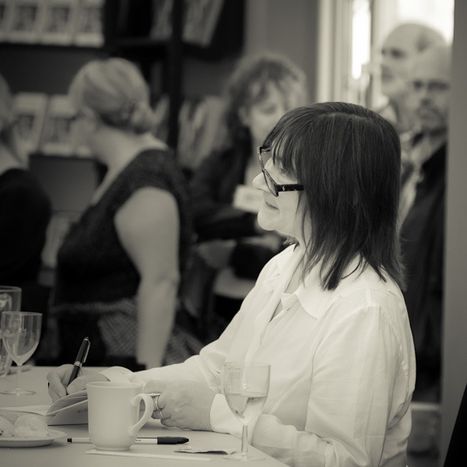
An interview with Scottish author Ali Smith
Published on
Reading a short story or a novel by Ali Smith can seem like chatting to the best kind of polymath friend. You leave with a mental list of books you can’t wait to read (essays by Italo Calvino, or Muriel Spark’s Momento Mori), music to play in the car (from Gershwin to Beethoven) and curious facts you can’t quite believe. (Is that really how the music for The Wizard of Oz was composed?)
Walking into the two-time booker nominee’s house is something like walking into one of those stories. A guide to identifying butterflies lies open on the table where we sit, along from a couple of small, unidentifiable sculptures. I bite back the itch to peruse the stacks of films lining the walls. And then there is the passion and curiosity of Ali herself, who is above all generous and genuine in her enthusiasm for other writers.
'The "I" is now a question'
When the conversation moves onto short story writer Katherine Mansfield, she exclaims, ‘Now there was a writer who could float on the surface on one level while doing fifteen things below that surface, holding them all below the surface. As you read a Mansfield, something three dimensional happens. You are made to question surface, and you are also made to understand the ways in which things are said, and the ways in which things which can’t be said are being said at the same time. In a Mansfield story the repercussions and the resonance are almost explosive.’ Later, when I ruefully admit to having failed to finish Lewis Grassic Gribbon’s classic trilogy A Scots Quair, she effuses, ‘Sunset Song is all about being seduced, about being adolescently, richly, elegiacally seduced, sexually and forcefully held.’
This passion for literature comes to the fore in her 2012 book Artful, a heady dose of fiction and essay originally written ‘on the hoof’, as she puts it, for a set of lectures on Comparative Literature at Saint Anne’s College, Oxford. The narrative which starts as a love story—or is it a ghost story?—dips in and out of gleeful, exuberant notes for lectures on literature and philosophy by way of Greek musicals. ‘If you stand in front of an audience and you speak and it’s a lecture, it’s as if you have some kind of authority,’ explains Ali, who admits to being wary of assuming such authority. ‘Coming in on a tangent with fiction allows you not to be there at the same time as being there. The “I”, as it were, is now a question. First of all, it’s questionable because it’s fiction in a lecture and that was a very exciting kind of disruption.’ She chuckles. ‘It really surprised the first audience, they really didn’t expect that they were going to be told a story. When I went back with the second lecture I knew that I was going to be able to allow myself anything I liked, because the audience had gone, “Oh, okay then.” The audience had shifted in its own parameter.
'I didn't have to be me; I could be anything'
‘It was an ongoing progress and process, knowing the audience was going to be different each time. Something of that fed back into the thing I was writing so fast. There was a great deal of,’ she pauses to take a breath, ‘liberation in it—I was allowed to be licit because of it. There was a relationship between me and the audience which meant that anything was possible. I didn’t have to be me, I could be anything. They didn’t have to be them, they could come in and be anything as well. It opened the space up.’
This sense of encounter, of opening up a liberating space, recurs in Smith’s fiction; unexpected (and frequently unwanted) visitors are a repeated, albeit always varied motif. ‘It’s not conscious,’ remarks Ali, ‘but I think it’s part of the place where writing goes,’ she breaks off and glances at her half-empty coffee cup, ‘or comes from. Really it’s an inheritance to have been born in a Scotland which was on the margins of things. On the margins of a larger country and to some extent on the margins of its own history.’
'The most exciting cocktail of a place is the liminal'
She continues more slowly. ‘The way that voice works most pressingly, most engagingly, most connectively and most interestingly is from the edge. In Artful there was a whole chapter on ‘the edge’ and when I was writing that very fast lecture, I realised that the most creative, most exciting cocktail of a place is the liminal, where all of the things which are not supposed to meet can meet. It’s not the same as a border. It’s actually a crossing-over place, which is ceremoniously, ritually interesting to us as a species, where all sorts of unsayables are said and can be said. So it’s something about the force in art to go the place which holds everything from madness to intense sanity and can connect,’ she pauses to find the right words, ‘all the opposites in us, oppositions in us which we work on all the time. The outside force, the thing that comes in and disrupts—it’s just art. How could I not write about it?’
Perhaps it is this sense of the liminal which leads to a very open attitude to literature from the writer, a refusal to pre- or proscribe. Does she believe there’s any one thing literature should do? ‘Everything,’ she states simply. ‘Writing should.’
She pours me another cup of coffee and gives a half smile. ‘Will that do?’
We finish our coffee and talk about the roots of words, wondering when the meanings of ‘penalty’ and ‘penance’ parted ways. I leave wanting to learn Latin, to identify butterflies and to finally return to Lewis Grassic Gibbon.



